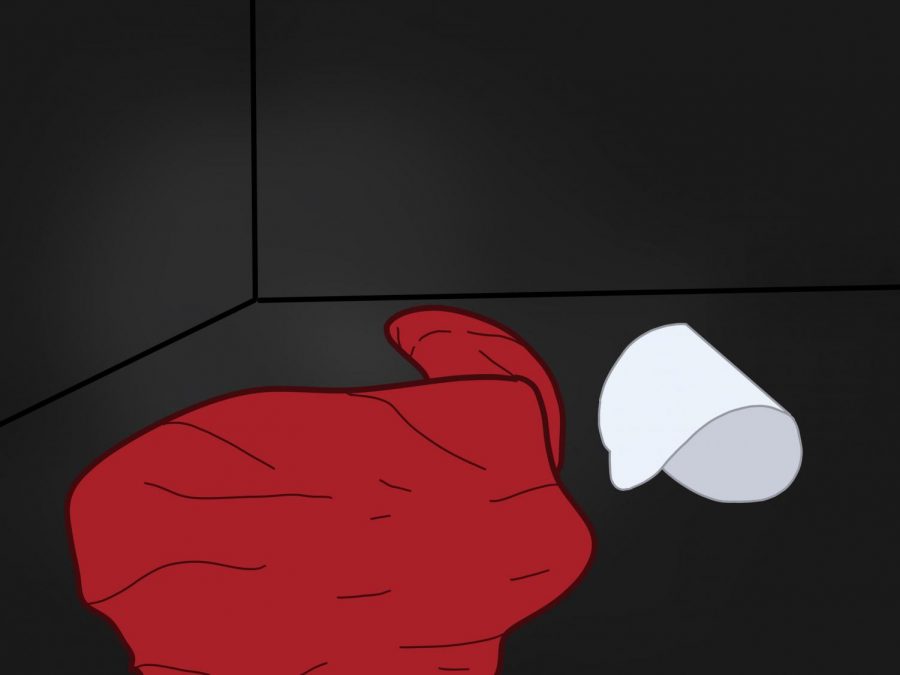Opinion: White women, Texas is not your personal ‘Handmaid’s Tale’
In response to a Texas law banning abortions after six weeks, many white women posted memes comparing the law to Margaret Atwood’s novel “The Handmaid’s Tale.” But these memes ignore the history of those most affected by this new law: people of color.
In light of Texas passing a law banning abortions after six weeks, many memes comparing the law to the novel The Handmaid’s Tale have been posted on social media. These memes ignore the people most historically impacted by reproductive rights — people of color. (Staff Illustration by Manasa Gudavalli)
September 9, 2021
Texas Gov. Greg Abbott signed a law in May banning all abortions past the six-week mark and allowing private citizens to sue abortion providers, abortion seekers and those enabling abortion seekers. The law went into effect on Sept. 1, 2021. The Supreme Court released their decision just before midnight that day, stating they would not take any action to block the most restrictive abortion law in the United States. The vote was 5-4, with Chief Justice Roberts joining the dissent.
Activists and organizers immediately took to the internet, calling attention to the new law and its drastic consequences for residents of Texas. Just as quickly, white women — including celebrities like Rosie O’Donnell and Cher — began comparing the law to Margaret Atwood’s dystopian novel “The Handmaid’s Tale.” Pro-choice demonstrators in Dallas even dressed in the famous red robes and white bonnets. Sen. Elizabeth Warren, when asked if the comparisons were hyperbolic, said “no.”
“Women with resources still get abortions,” Warren said in that same interview. “What this law is really about is not stopping abortions across the board. This is about bearing down on the most vulnerable among us.”
Historically, the most vulnerable have been low-income women of color, particularly Black women. As activist and organizer Bree Newsome tweeted on Sept. 1, “If you think A Handmaid’s Tale is shocking, wait until you learn the history of Black women in America.” And as she had pointed out in an earlier tweet, “Also, ‘we’re becoming A Handmaid’s Tale’ is actually a super white-centered take that completely ignores we’re living in a struggle against genocide and slavery that’s been going on over 500 years.”
If you think A Handmaid’s Tale is shocking, wait until you learn the history of Black women in America
— END ALL COLONIALISM, FREE PALESTINE (@BreeNewsome) September 1, 2021
Reproductive scientists have continually harmed communities of color. J. Marion Sims, the so-called Father of Gynecology, revolutionized the medical field through his various experiments on enslaved Black women’s reproductive organs. All of these experiments were done without consent or anesthesia. However, for the white women on whom he later performed medical procedures, consent was obtained and anesthesia administered.
In the 20th century, with the advent of hormonal birth control pills, pharmaceutical companies began human testing on low-income women in Puerto Rico. Meanwhile, the so-called science of eugenics sterilized more than 60,000 people in 32 states, most of whom were women of color and disabled women. Unwanted sterilizations were performed on nearly 1,400 women in California prisons between 1997 and 2010 — prisons disproportionately occupied by Black and Latinx women. Even as recently as last year, immigrant women were allegedly sterilized at ICE concentration camps on the border.
White people making a comparison between the United States and “The Handmaid’s Tale” are predicting a future dystopia. The truth is that Black women have lived without reproductive agency for centuries in the United States and around the world. The “Handmaid’s Tale” narrative allows white women — among the most vocal supporters of the Texas abortion law — to structure this issue as man versus woman. In reality it is white evangelical supremacy versus oppressed peoples.
Even Margaret Atwood, describing how she wrote “The Handmaid’s Tale,” said “One of my rules was that I would not put any events into the book that had not already happened in what James Joyce called the ‘nightmare’ of history.” It is the responsibility of white women to understand the subjugation women of color have endured throughout history — especially given that such subjugation set a precedent for current legislative measures restricting reproductive agency. As Twitter user @XimenaIQuintana wrote, “Is texas the handmaid’s tale or are white women finally living what Black and Brown women have lived for centuries?”
https://twitter.com/XimenaIQuintana/status/1435649725118787586?s=20
Contact Srishti Bungle at [email protected].


























































































































































GAIL Seaton Humbert • Oct 29, 2021 at 11:27 am
No this is not a racial issue at all and I am sure the author of this fundamentally disgusting article knew exactly that, as it is just an attempt to sow division in opponents of this horrific law!
We are NOT stupid.
A • Oct 1, 2021 at 4:10 pm
The Handmaids Tale made droves of white women, and Christian women, wake tf up to the dangers of the extremist Christian Right/evangelicals. We need to be able to imagine what that looks like in order for that reality to sink in. Yeah, the author is a white woman, the show kept the leading characters as white women, and that is the real problem. They hardly tried for equal representation in character-casting. Sure, fuck the show, but the message is still sound. And it’s a great starting point for many white women, who will then be more open to hearing the realities in the past and present for other ethnic groups. Of course it’s sad that it takes fiction in order for people to pay attention to realities, but as long as they get there then that’s a win.
Dan • Sep 29, 2021 at 8:53 pm
You make great points, although to further the conversation about protest, I would argue a mass of people in red handmaids tale outfits is quite a sight and the imagery is powerful on its own, including to people who don’t understand the nightmare history of the US, including trumpist women. To many of them, more effective protest methods are “out of bounds” and this method would be difficult for news to spin. So I think it is helpful to the individual cause for women’s rights, yet not enough, and leaves out the reality of the oppressed, all at once.
Cat Dickerson • Sep 26, 2021 at 9:18 am
I feel that pitting one ethnic group against another is exactly what the white evangelical right is pushing for. We are strongest in unity not division. Poor women of all races and backgrounds will be negatively impacted by these laws. Many times I’ve wondered why the far right places such great emphasis on the “right to life” of the fetus but ignores the rights of the already born to have a decent chance in life beyond the womb – health care, affordable housing, quality education? My theory is that their real concern is the shortage of white babies being carried to term. The irony is that the demographic shift is inevitable and perhaps even karmic. Passing these highly restrictive abortion laws will inevitably speed that process not reverse it.
MS • Sep 25, 2021 at 2:35 pm
Thanks so much for this great article! So important for folks wanting to support reproductive rights to recognize the harmful history and disproportionate impact of current bills on Black women and communities of color.
Addie Alexander • Sep 17, 2021 at 11:41 pm
Nah. Lifelong New Yorker here moved to Austin. While I would never argue about privilege being white women’s reality the numbers of poor white women effected by this draconian law is huge. The comparison to Hand Maid’s Tale does not negate the vicious treatment Black women have experienced at the hands of the evangelical patriarchy.
Theresa Jenkins • Sep 17, 2021 at 7:32 pm
I don’t see this as a “Victims Olympics”. I see it as setting the record straight. Minority women especially Black women have had this reality for centuries in this country. The message of “your body doesn’t belong to you”. And a majority of white women put these politicians who pass these laws into positions of power. Something like 52-53 % of white Ellen voted for tRUMP who avowed to put judges into district courts, federal courts and SCOTUS precisely for how they would hand down conservative decisions on reproductive rights with the ultimate goal of overturning Roe v Wade. So while these women vote and elect conservatives into power they themselves know that if they or their daughters ever needed one they could access one easily. Shame on them.
A woman • Sep 16, 2021 at 6:40 pm
Really don’t understand the rationale behind this argument. Do you see white women as your enemy in this fight against abortion ban? Does that do any justice to Black and Brown women? How about Asian women? Did you intentionally leave them out of this discussion by ignoring their existence?
Jdlis • Sep 15, 2021 at 3:23 pm
This isn’t a competition in victim Olympics and one doesn’t have to be affected by a bad law to speak out against it.